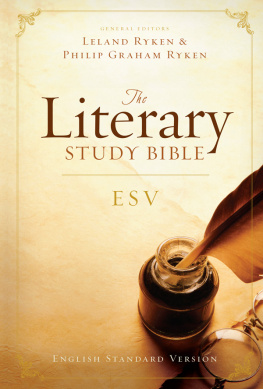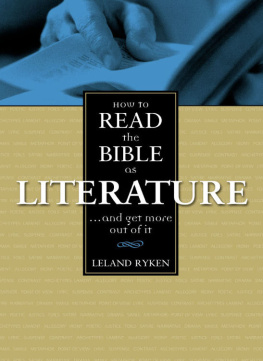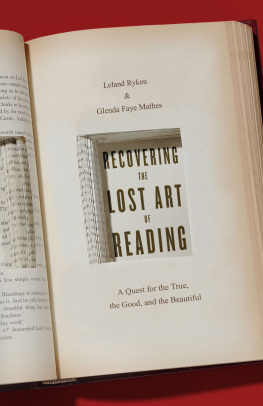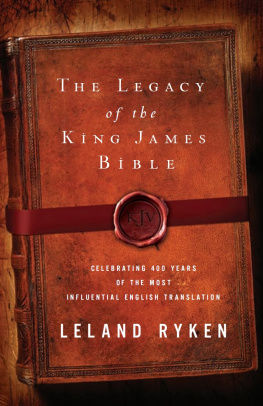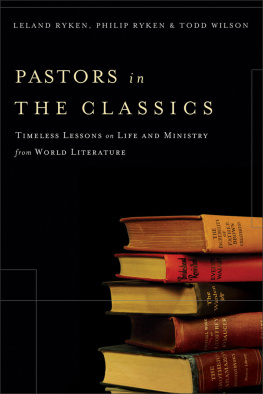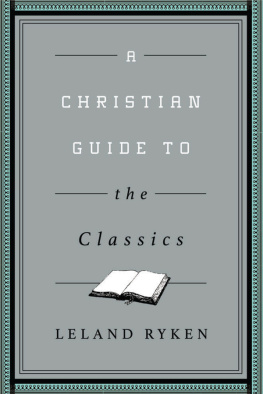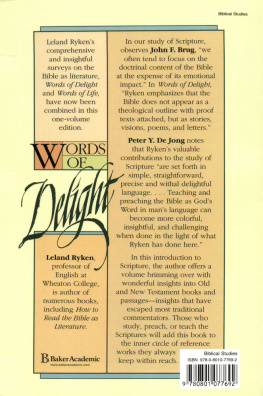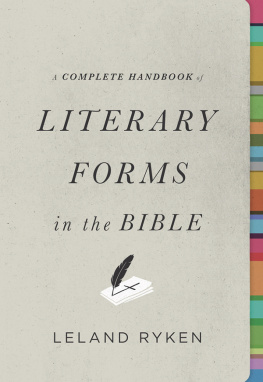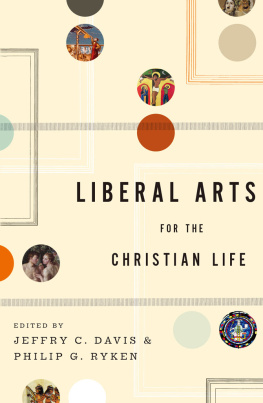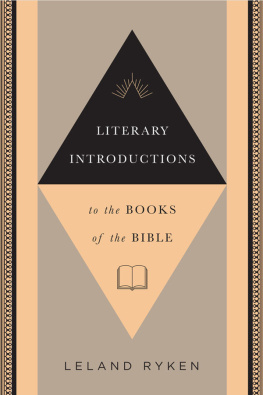Leland Ryken - The Christian Imagination: The Practice of Faith in Literature and Writing
Here you can read online Leland Ryken - The Christian Imagination: The Practice of Faith in Literature and Writing full text of the book (entire story) in english for free. Download pdf and epub, get meaning, cover and reviews about this ebook. year: 2011, publisher: The Crown Publishing Group, genre: Religion. Description of the work, (preface) as well as reviews are available. Best literature library LitArk.com created for fans of good reading and offers a wide selection of genres:
Romance novel
Science fiction
Adventure
Detective
Science
History
Home and family
Prose
Art
Politics
Computer
Non-fiction
Religion
Business
Children
Humor
Choose a favorite category and find really read worthwhile books. Enjoy immersion in the world of imagination, feel the emotions of the characters or learn something new for yourself, make an fascinating discovery.

- Book:The Christian Imagination: The Practice of Faith in Literature and Writing
- Author:
- Publisher:The Crown Publishing Group
- Genre:
- Year:2011
- Rating:5 / 5
- Favourites:Add to favourites
- Your mark:
- 100
- 1
- 2
- 3
- 4
- 5
The Christian Imagination: The Practice of Faith in Literature and Writing: summary, description and annotation
We offer to read an annotation, description, summary or preface (depends on what the author of the book "The Christian Imagination: The Practice of Faith in Literature and Writing" wrote himself). If you haven't found the necessary information about the book — write in the comments, we will try to find it.
The Christian Imagination: The Practice of Faith in Literature and Writing — read online for free the complete book (whole text) full work
Below is the text of the book, divided by pages. System saving the place of the last page read, allows you to conveniently read the book "The Christian Imagination: The Practice of Faith in Literature and Writing" online for free, without having to search again every time where you left off. Put a bookmark, and you can go to the page where you finished reading at any time.
Font size:
Interval:
Bookmark:
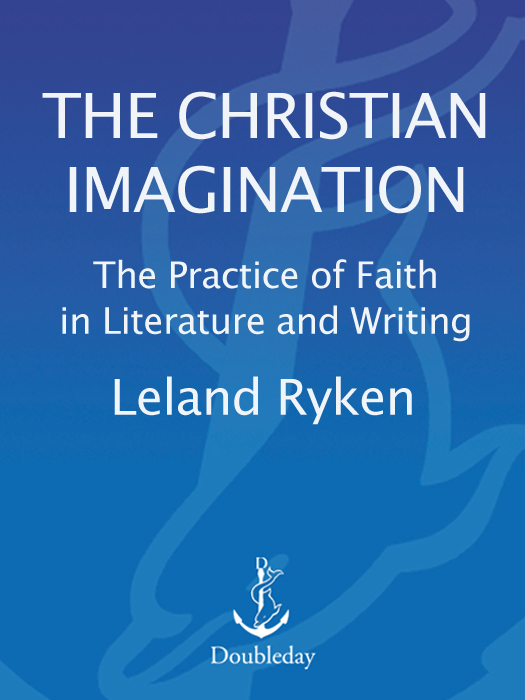
O THER B OOKS BY L ELAND R YKEN
A Dictionary of Biblical Imagery (coeditor)
Redeeming the Time: A Christian Approach to Work and Leisure
The Discerning Reader: Christian Perspectives on Literature and Theory
A Complete Literary Guide to the Bible (coeditor)
Contemporary Literary Theory: A Christian Appraisal (coeditor)
Realms of Gold: The Classics in Christian Perspective
The Liberated Imagination: Thinking Christianly About the Arts
Effective Bible Teaching (coauthor)
Work and Leisure in Christian Perspective
Words of Life: A Literary Introduction to the New Testament
Words of Delight: A Literary Introduction to the Bible
Worldly Saints: The Puritans as They Really Were
Culture in Christian Perspective
Windows to the World: Literature in Christian Perspective
The New Testament in Literary Criticism (editor)
How to Read the Bible as Literature
Milton and Scriptural Tradition (coeditor)
Triumphs of the Imagination
The Literature of the Bible
The Apocalyptic Vision in Paradise Lost
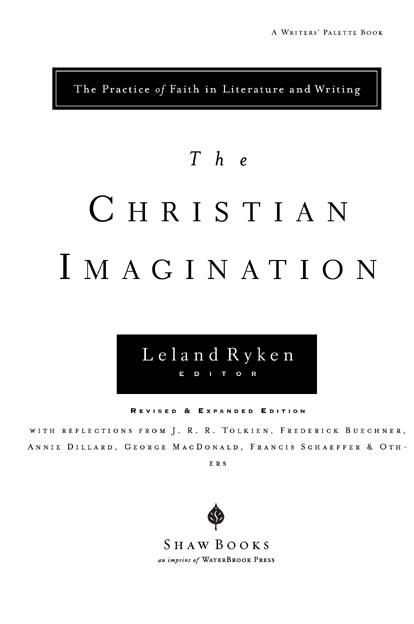
The Christian Imagination
A S HAW B OOK
P UBLISHED BY W ATER B ROOK P RESS
12265 Oracle Boulevard, Suite 200
Colorado Springs, Colorado 80921
All Scripture quotations, unless otherwise indicated, are taken from the Holy Bible, New International Version. NIV. Copyright 1973, 1978, 1984 by International Bible Society. Used by permission of Zondervan Publishing House. All rights reserved. Scripture quotations marked ( ESV ) are taken from The Holy Bible, English Standard Version, copyright 2001 by Crossway Bibles, a division of Good News Publishers. Used by permission. All rights reserved. Scripture quotations marked ( KJV ) are taken from the King James Version. Scripture quotations marked ( RSV ) are taken from the Revised Standard Version of the Bible, copyright 1946, 1952, and 1971 by the Division of Christian Education of the National Council of the Churches of Christ in the USA. Used by permission.
For further acknowledgments please see .
eISBN: 978-0-307-56884-7
Copyright 2002 by Leland Ryken
All rights reserved. No part of this book may be reproduced or transmitted in any form or by any means, electronic or mechanical, including photocopying and recording, or by any information storage and retrieval system, without permission in writing from the publisher.
Published in the United States by WaterBrook Multnomah, an imprint of The Doubleday Publishing Group, a division of Random House Inc., New York.
S HAW B OOKS and its aspen leaf colophon are registered trademarks of Random House Inc.
Portions of this book have been previously released by Baker Books under the same title.
v3.1
For my grandchildren
T he idea for this book came from the continuous requests that I received for copies of a book that I edited two decades ago titled The Christian Imagination: Essays on Literature and the Arts. While the present book contains relatively little overlap with its predecessor, it began with a similar impulse, which was to make available in a single volume the best that has been written about the announced subject.
The result is a book that covers all of the essential topics related to literature and writing as viewed from Christian perspectives. My guiding principle as a compiler of this anthology has been comprehensiveness: I have included both past and living authors, both writers of imaginative literature and literary critics, both poetry and narrative, and the interests of both writers and readers. I know of no other book that brings together this much information about Christianity and literature.
In terms of format, the main units of the book contain foundational essays and shorter excerpts labeled viewpoints. In addition, five of the main units conclude with collections of choice excerpts on the respective topics.
Elizabeth Goudge, herself a compiler of anthologies, wrote in the preface to A Book of Comfort:
And so of the making of books there is no end, and of the making of anthologies there seems particularly to be no end because we are all anthologists. The collection and hoarding of bits and pieces is basic to all animals, from the squirrel with his nuts to the anthologist with his oddments stored up in his memory. Anthology-making is therefore essentially selfish, like self-preservation with the advantage of literature over nuts that it can be shared without personal loss to the hoarder.
In compiling this anthology I did, indeed, make sure that I included virtually all of my favorite passages, large and small, on the production and reading of literatureeven to the extent of including short gems in boxed form throughout the essays of the book.
The book that follows is for lovers of literature, both readers and writers. It contains theory that will clarify thinking about the nature and value of literature. It is equally a practical book, filled with tips for reading and writing literature in the best ways possible. The keynote of the book is excellenceexcellence in reading, in writing, in thinking about literature, in teaching and studying literature.
As the contributors to this volume declare, Christian writers and readers alike are free to revel in literaturein its ability to capture human experience, in its capacity to express truth, in its potential to provide the occasion for artistic enrichment and enjoyment. Here you will find a celebration, a discussion, an appreciation of the Christian imagination.

A n aesthetic is a philosophy of art. A poetic is a philosophy of literature, specifically. This unit of the book covers both. The perennial issues of art and literature that underlie the essays and excerpts that follow include these:
What is the subject of art and literature?
What is the relationship between art and life?
What are the purpose, function, and effects of art and literature?
How can art and literature be defended (the apologetic angle)?
When we attach the adjective Christian to the word aesthetic, a whole further set of considerations is set into motion. At heart, these considerations involve relating the issues of aesthetics to Christian doctrine and biblical example, thereby placing the issues into a context of Christian belief and experience. Since the ultimate source of Christian belief is the Bible, the Bible naturally assumes a central role in this enterprise.
The aim of this opening unit of the book is to introduce the leading themes of aesthetics and to provide a range of ways in which various Christian thinkers and writers have related these to Christian interests.
Donald T. Williams

T he story of Christian poeticsthat is, of Christians thinking consciously as Christians about the nature and significance of literary artis the tale of a movement struggling almost in spite of itself to come to grips with its own doctrine that human beings are created in the image of God. The faith was born into a pagan culture and has survived into a secular one which shows signs of returning to paganism. The church has perforce used the languages, the markets, and the forms of the surrounding culture. It has transformed them and been transformed by them. In the West, as the faith and the culture grew up together, this process has at times made them all but indistinguishable. What has Athens to do with Jerusalem? asked Tertullian; and the answers, while legion, have never been simple or easy.
Font size:
Interval:
Bookmark:
Similar books «The Christian Imagination: The Practice of Faith in Literature and Writing»
Look at similar books to The Christian Imagination: The Practice of Faith in Literature and Writing. We have selected literature similar in name and meaning in the hope of providing readers with more options to find new, interesting, not yet read works.
Discussion, reviews of the book The Christian Imagination: The Practice of Faith in Literature and Writing and just readers' own opinions. Leave your comments, write what you think about the work, its meaning or the main characters. Specify what exactly you liked and what you didn't like, and why you think so.

